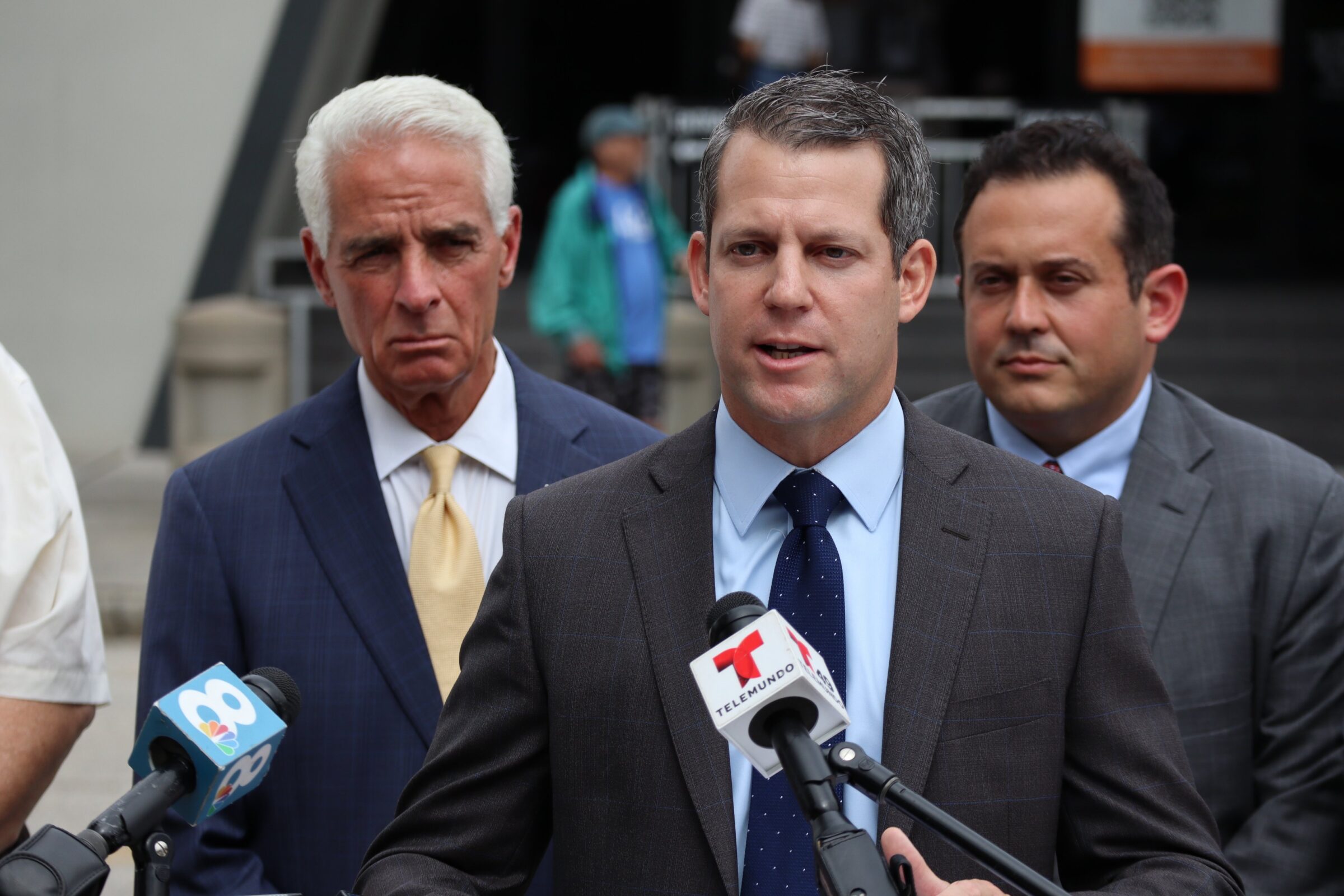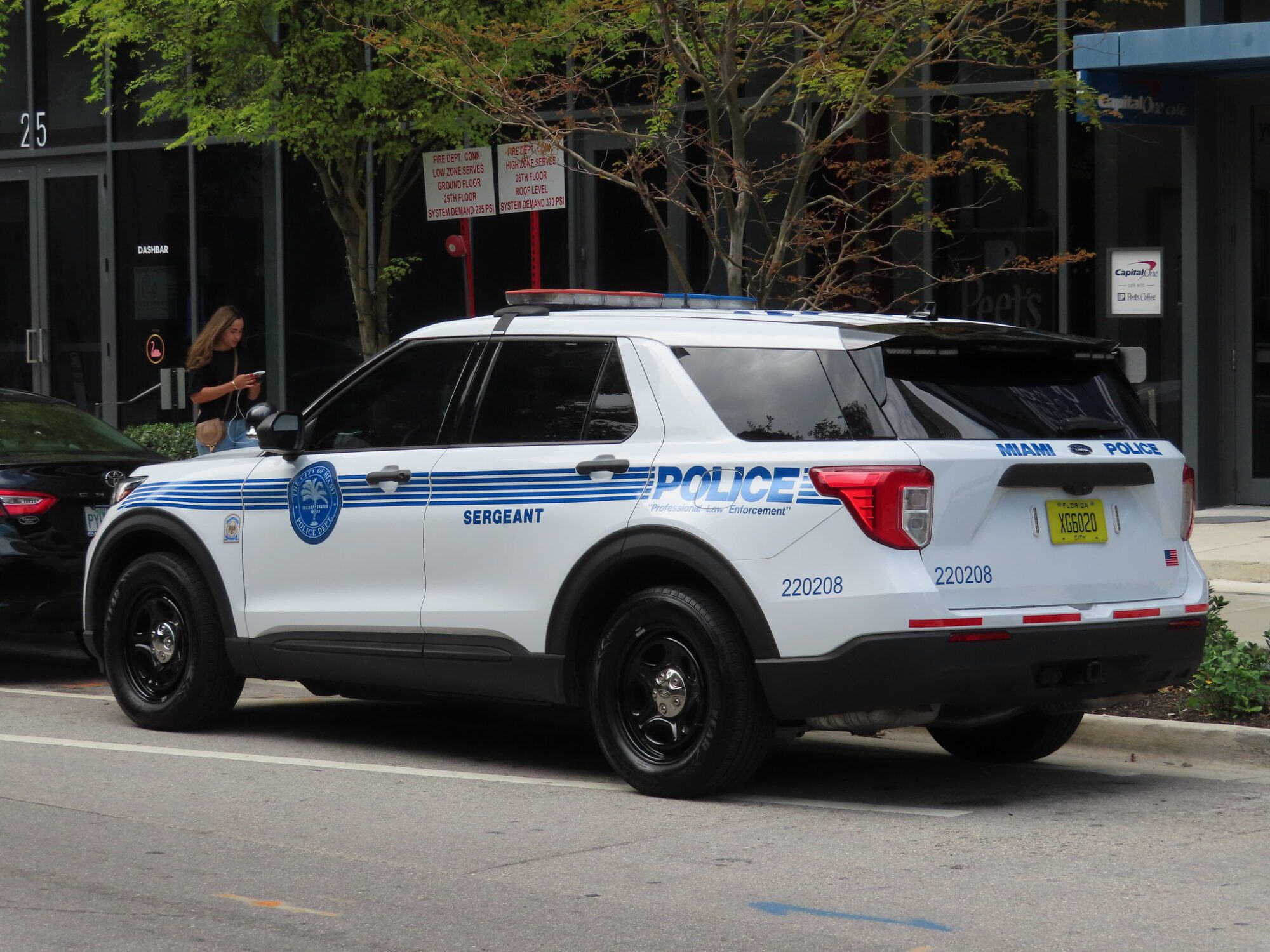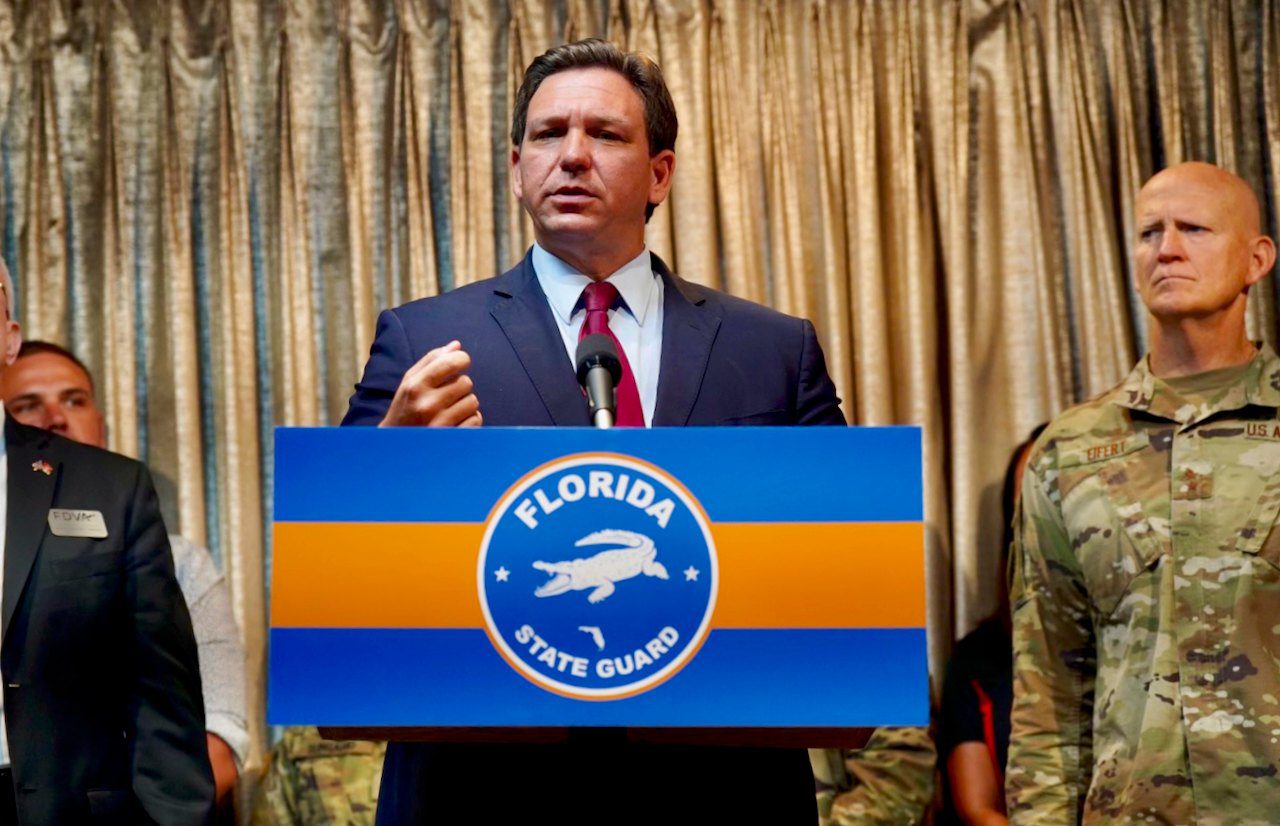Tampa Voters Get Their Say Two Years After DeSantis Axed Their Democratic Prosecutor
Andrew Warren wants his job back. He is challenging Suzy Lopez, the Republican who replaced him and stopped his policy meant to curb unfair prosecutions of Black residents.
| August 14, 2024

Andrew Warren is running to win back his old job as Tampa’s top prosecutor. Since the Democrat joined the race in April, he has released campaign videos, basked in endorsements, and raised hundreds of thousands of dollars—all the staples of a typical campaign.
But this campaign is anything but typical. Two years ago, Warren was abruptly suspended from his office by Florida Governor Ron DeSantis, who said he had neglected his duties because of statements such as a promise to not prosecute abortion cases. DeSantis summarily replaced him with Susan Lopez, a Republican who immediately reversed some of Warren’s signature policies, including his effort to stop the aggressive prosecutions of Black cyclists and pedestrians in Hillsborough County.
Voters will now weigh in for the first time since DeSantis ousted the state attorney they elected. Lopez is running for a full term, but it’s Warren who won the office the last two times it was on the ballot, in 2016 and 2020. If he wins the Democratic nomination next week, he’ll face Lopez, who is running unopposed in the GOP primary, in November. (Editor’s note: Warren prevailed in the Aug. 20 Democratic primary; he will face Lopez on Nov. 5.)
The circumstances of Warren’s removal loom large over his third run. Hillsborough County has leaned Democratic in the past, but if Warren wins, DeSantis could try suspending him again. Warren filed lawsuits arguing that DeSantis exceeded his authority when he removed him the first time, and a federal appeals court earlier this year kept his case alive. Some experts say it’d be harder for the governor to suspend him again in the future, but these legal questions remain unsettled.
“Every Democratic candidate in Florida has to campaign under the threat of DeSantis removing them solely because they’re a Democrat, solely for political reasons,” Warren told Bolts.
Last year, DeSantis also suspended the elected Democratic prosecutor of Orlando, Monique Worrell, whose sentencing practices he disagreed with. He had already removed Broward County’s Democratic sheriff, replacing him with a new sheriff who backtracked on a local reform.
Lopez, too, rolled back Warren’s reforms within just days of replacing him. On Aug. 8, 2022, just four days after her appointment, she sent a memo to her staff announcing changes to the office’s policies. Among them: She lifted Warren’s restrictions on prosecuting people when their charges stemmed from bike and pedestrian stops conducted by the Tampa police.
“Effective immediately, any policy my predecessor put in place that called for presumptive non-enforcement of the laws of Florida is immediately rescinded. This includes the bike stop and pedestrian stop policy,” Lopez said in her memo. DeSantis had named this reform among his reasons for removing Waren, saying that it demonstrates a “fundamentally flawed and lawless understanding of his duties as a state attorney.”
Warren had set up his policy in the wake of a 2015 Tampa Bay Times investigation that revealed that the majority of cyclists stopped by the Tampa police were Black. The story sparked an investigation by the U.S. Department of Justice that reached the same conclusion in 2016: Of 9,121 bicycle stops made by Tampa police over a 20-month period, 73 percent of those involved Black cyclists. Tampa’s population is 26 percent Black.
The data ignited organizing in Hillsborough County. Civil rights organizations demanded reforms from both the local police and the state attorney’s office, which handles prosecutions. In some of these cases, the office was ensnaring cyclists in the criminal legal system by charging them with misdemeanors over nonviolent actions related to the bike stops, such as riding away from police or refusing to show identification.
Once he became the state attorney in 2017, members of the local chapter of the NAACP met with Warren to ask him to stop prosecuting those cases. “We were having conversations over and over again,” recalled Yvette Lewis, president of the Hillsborough County NAACP. The effort took years, with Warren forming a Racial Justice Work Group to examine the issue in the fall of 2020, after that summer’s Black Lives Matter protests, and finally releasing a new policy in January 2022.
In a memo to his staff, Warren instructed them to adopt a default approach of not prosecuting nonviolent, misdemeanor cases that result from these stops, broadening the policy’s purview to include pedestrian stops as well as bike stops. He also said line prosecutors should weigh whether the facts of the alleged crime still merit prosecution. “Actual or even perceived racial disparities in the use of bicycle and pedestrian stops undermine trust within the communities that law enforcement serves,” Warren said in a memo.
In an interview with Bolts, Warren said “the reason why we were taking a critical look at those cases is because we don’t want to encourage that stop in the first place.”

Prosecuting those stops without first examining them, he said, was “perpetuating the revolving door to the criminal justice system.”
“Obviously, we want people to comply with law enforcement,” he said. “We also don’t want to put more people into the system that can have a negative impact on their ability to earn a living and potentially cost taxpayer dollars to prosecute them and take away their freedom when they hadn’t done anything wrong in the first place.”
Tampa’s Black residents cheered the change, Lewis said. “The community felt like, OK, they can take a deep breath.”
Since Lopez lifted Warren’s policy and signaled to police that the stops they made would get prosecuted again, the fear of aggressive prosecution has returned, Lewis says.
“We were definitely devastated by what she did,” she said. “It took us 10 steps back when it comes to helping the most vulnerable people that need help.”
Lewis said she has met with Lopez about the change but has made no progress toward switching it back. “I don’t think she gets it at all,” she said. “She’s never walked in our shoes. When you try to talk to her to get understanding, she doesn’t come with an open mind.”
Erin Maloney, a spokesperson for Lopez’s office, told Bolts in an email that Warren’s policy was just for show. “By the time Andrew Warren instituted that policy, Tampa Police had already changed how bike stops were conducted altogether,” she wrote. “He took a problem that didn’t exist and offered a solution.”
But Maloney also faulted Warren for going too far in refusing to enforce Florida law, saying, “State Attorney Lopez follows the law instead of creating blanket policies that change the law.”
In November 2022, months after she became state attorney, Lopez gave a deposition in which she seemed to confirm that the Tampa police were still sending over bike stop cases to the state’s attorney’s office during Warren’s tenure. Lopez worked as a staff prosecutor in Warren’s office for part of his tenure before she became a county judge in late 2021. She said she saw those cases come in, and criticized Warren for how he handled them. (Lopez gave this deposition as part of one of Warren’s lawsuits to be reinstated.)
It’s unclear how many people have been prosecuted under Lopez in cases that stem from bike stops. Maloney said the office does “not have a way” to determine whether past charges were tied to such stops. Still, a review of the Hillsborough County court system database shows that Lopez’s office has pursued criminal charges in such cases.
In March, for example, police arrested a 31-year-old Black man who was walking in South Tampa because he did not comply with commands to stop and show his hands. He was charged with resisting arrest without violence, a misdemeanor, and detained on a $500 bond. Lopez’s office took the case to trial and lost; the jury found the man not guilty.
In another case, prosecutors sought charges against a homeless Black man who fled police on his bicycle after they tried to stop him for disobeying traffic signals. The case was dismissed, only after a judge declared the man incompetent.
Warren staunchly defended his past policy in an interview with Bolts, but he also was vague when asked whether he planned to bring it back if re-elected.
He said he would look at the data to see whether there was a reason to implement it, noting that these cases make up just a small fraction of the 60,000 cases referred to the office each year. He also said he would “keep doing the types of things that we did before.”
Warren may be worried that DeSantis will use whatever promise he makes against him. In early January, Warren announced that he wouldn’t run for state attorney because he feared that the governor would just be able to remove him again. Up until that point, courts had rejected his pleas to overturn DeSantis’ suspension; even a federal district judge who said that DeSantis had probably acted unconstitutionally also ruled that he lacked the authority to reinstate Warren.
Warren changed his mind about running after he secured a victory against DeSantis in the 11th Circuit Court of Appeals, which instructed the lower court to reconsider reinstating Warren.
Elizabeth Strauss, a local attorney, does not want Democrats to take the risk. She is running against Warren in next week’s primary and says she is a safer choice.
“A vote for Warren is a vote for Suzy,” she told Bolts repeatedly in an interview, warning that DeSantis could intervene to make sure Lopez remains in office if Warren wins.
“I just want people to vote with an informed decision and knowing that, okay, if I vote for him, there’s a chance he could get removed Day One,” Strauss said. “There’s other ways to challenge this and bring awareness to what the governor did without having the voters throw away their votes and end up with somebody that’s basically going to be his puppet.”

Strauss said she would not sign onto national policy statements like the ones Warren had joined while in office, which vowed to not prosecute cases involving abortions or anti-transgender laws. “I don’t plan on making myself vulnerable,” she said. In an email follow-up, she explained she would take a different approach to tackling issues with police stops by forming a civil rights unit. “While I will not refuse to prosecute based on any blanket policies, a Civil Rights Unit which actively investigates these matters is a more effective way to deter abuse of power by law enforcement officers,” she said.
Warren dismissed Strauss’ concerns, saying that he was focused on winning the general election in November. He has asked federal courts to expedite his case before the election, to no avail so far.
Carissa Byrne Hessick, director of the Prosecutors and Politics Project at the University of North Carolina, says she can see voters reacting to Warren’s comeback effort one of two ways. “It could be the sort of thing that really motivates voters to go to the polls and check the box for him,” she said. But, she added, “They might think that was too much chaos, and we don’t want to be fighting with the state.”
Robin Lockett, Tampa Bay regional director of Florida Rising, a voting rights advocacy organization that has endorsed Warren, told Bolts that she falls in the former group.
“I think it’s brave of Andrew to still do what’s right for the people,” she said. “He can’t run in fear.”
Some Democratic voters, meanwhile, may be living in trepidation that the governor will just keep disregarding election results, no matter the office and the Democrat who wins. Other candidates running for local office have faced a similar cloud. “Sometimes it feels like a set up—or it’s all just theater,” a Democrat running for prosecutor in St. Petersburg told Bolts two years ago. This year, Worrell is seeking her old job back in Orlando, much like Warren is in Tampa.
At a political forum in May that featured the three state attorney candidates, as well as two candidates running for public defender, one attendee told them, “All of you are subject to being suspended by the governor.”
Sign up and stay up-to-date
Support us
Bolts is a non-profit newsroom that relies on donations, and it takes resources to produce this work. If you appreciate our value, become a monthly donor or make a contribution.




